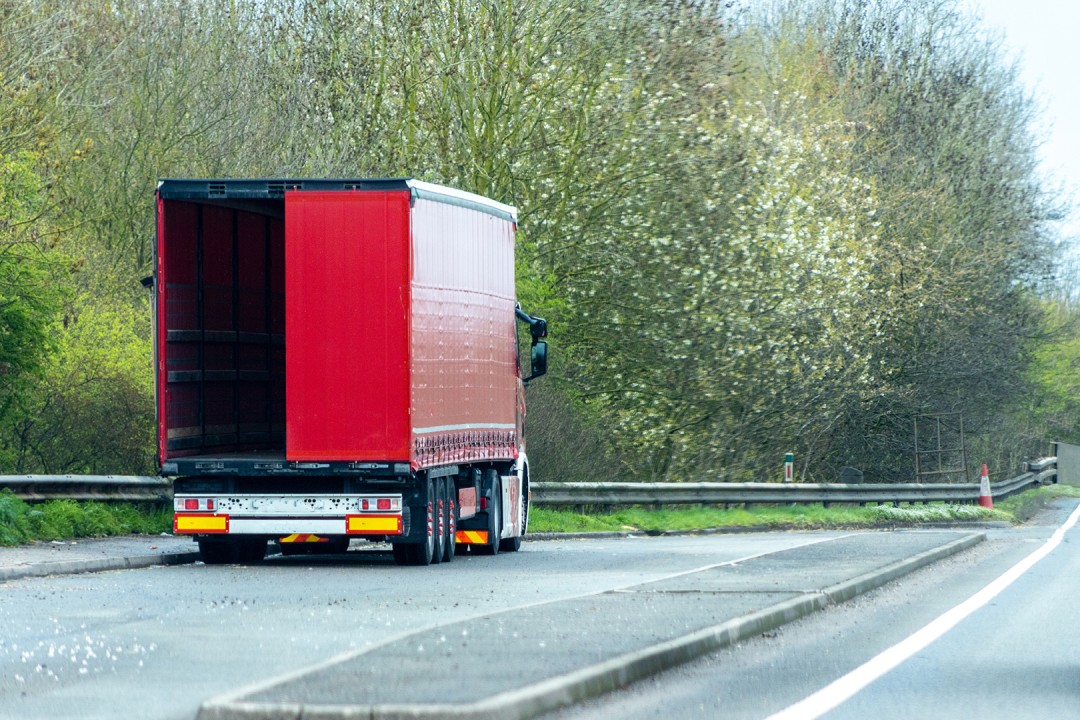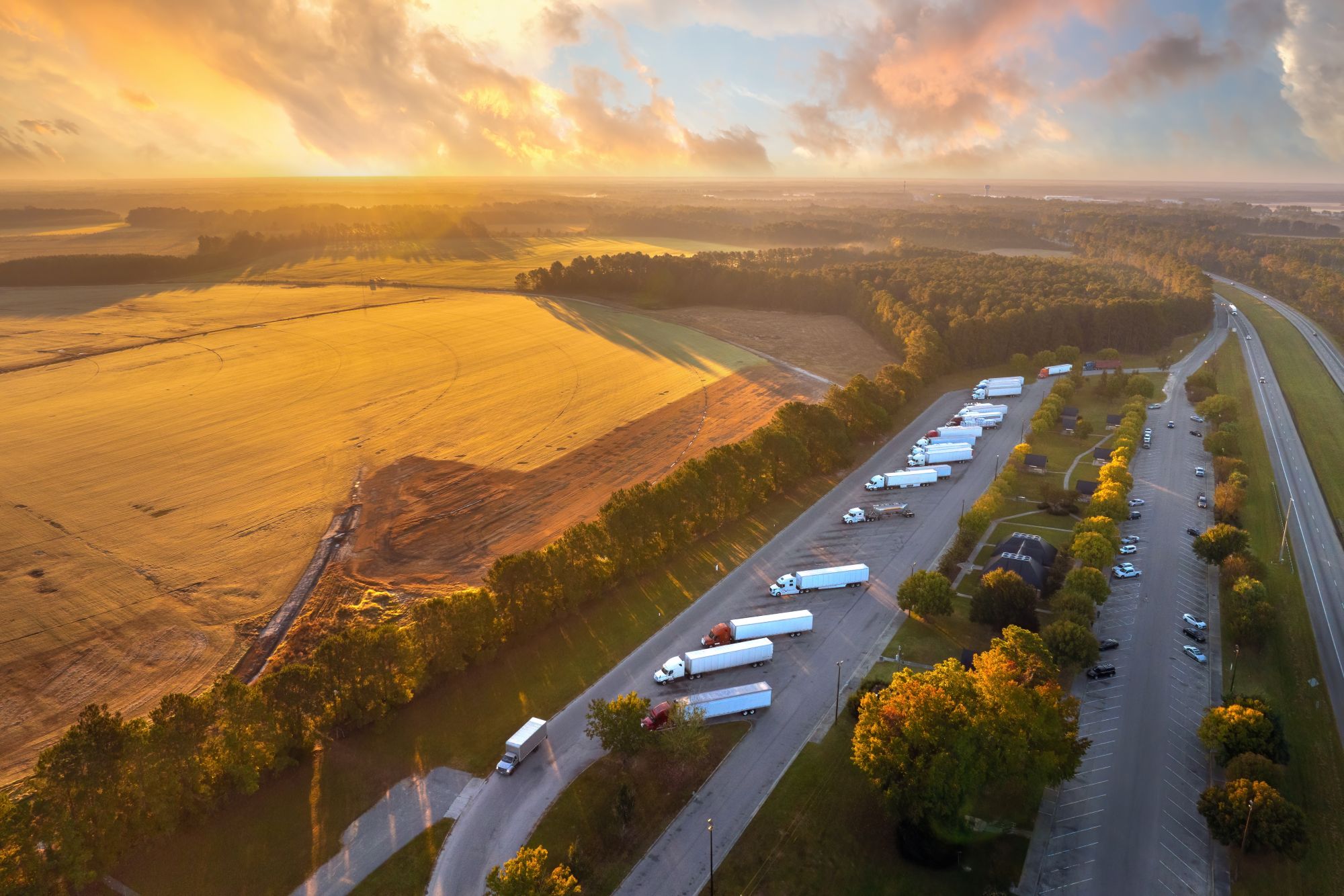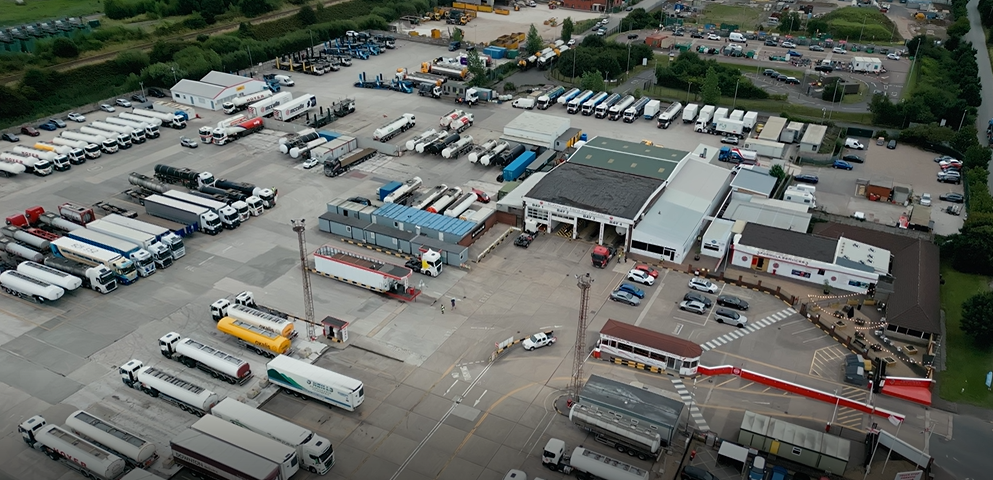
Susie Jones
Os condutores estão a preferir as áreas de paragem em vez das estações de serviço
Criado: 19/08/2024
•
Atualizado: 19/08/2024
Em 2022, o Reino Unido registou mais de 5.000 denúncias de crimes contra o transporte de mercadorias, o que representa uma perda de cerca de 66 milhões de libras. O aumento da criminalidade no transporte de mercadorias representa uma ameaça crítica para as cadeias de abastecimento, empresas e consumidores - causando uma preocupação significativa para os profissionais do sector dos transportes.
Um relatório publicado pela polícia de Cambridgeshire mostra que 46% de todos os roubos de carga ocorrem em ruas e parques de estacionamento e 27% em estações de serviço. Apesar disso, a escuta social mostra que muitos condutores continuam a estacionar em parques de estacionamento por várias razões.
Os problemas com o estacionamento em parques de estacionamento
Para os condutores, estacionar durante a noite num parque de estacionamento é muitas vezes a opção mais simples e económica. No entanto, apresenta várias desvantagens que podem ter um impacto negativo na saúde mental e na segurança do condutor.
Instalações - Os condutores precisam de mais instalações, como casas de banho, chuveiros e comida. A falta de instalações limpas pode aumentar o desconforto e afetar negativamente o sono, a concentração e a saúde mental.
Segurança dos condutores - O estacionamento em áreas de paragem de emergência representa um risco acrescido para a segurança dos condutores. Um estudo realizado pela [AA] (https://www.transport-network.co.uk/Highways-AA-warns-of-danger-lurking-in-lay-bys/7695#:~:text=The%20Too%20close%20for%20comfort,the%20vehicles%20that%20are%20hit.) concluiu que dois terços dos acidentes mortais envolvendo veículos parados numa estrada com duas faixas de rodagem ocorreram em áreas de estacionamento - mais de metade dos veículos atingidos eram veículos pesados de mercadorias.
Roubo de carga - O sector registou um aumento de 380% no roubo de carga entre junho e julho de 2023, realçando a necessidade de estacionamento seguro e protegido. Com ladrões oportunistas a visar os parques de estacionamento, os condutores arriscam-se a perder a sua carga e as frotas arriscam-se a perder milhões de libras.
Porque é que os condutores estão a estacionar em parques de estacionamento
Apesar dos riscos, a auscultação social realizada através do Facebook sugeriu que 70% dos condutores estavam menos inclinados a escolher um parque de camiões em vez de um parque de estacionamento por várias razões:
Segurança
As reacções nas redes sociais sugerem que 43% dos condutores de camiões optam por não estacionar numa paragem de camiões ou numa estação de serviço devido à falta de medidas de segurança.
"Só estaciono em parques de estacionamento ou em zonas industriais. Quando estacionei em serviços/paragens de camiões, cortaram-me as cortinas", afirma o camionista Luke.
A segurança das paragens de camiões em todo o Reino Unido tem sido um tema de discussão no sector dos transportes - com os condutores a solicitarem mais apoio ao Governo para fornecer instalações de segurança adicionais. De acordo com as reacções anteriores, os condutores gostariam que a [taxa HGV] (https://motortransport.co.uk/industry-news/drivers-want-hgv-levy-funds-spent-on-truck-stops/17658.article) fosse investida em estacionamento mais seguro, higiénico e acessível.
A partir das redes sociais, 59% dos condutores de camiões afirmaram que o Reino Unido não dispunha de suficientes parques de estacionamento seguros e protegidos em comparação com a Europa. Uma opinião corroborada pelo feedback do [SNAP's Truck Park Tour] (https://snapacc.com/truckpark-tour-2023/), em que 31% dos condutores europeus afirmaram ter beneficiado mais do acesso a locais SNAP exclusivos e seguros. A organização de segurança TAPA é amplamente reconhecida na Europa - com muitos locais a possuírem certificações de nível 1, 2 ou 3.
Em contrapartida, o Reino Unido tem apenas dois locais com certificação TAPA - com auditores autorizados com formação SNAP PSR de nível 3 a acreditarem os locais. A Formula Services e o The Red Lion possuem ambos uma certificação de Nível 3 - com uma infração registada no The Red Lion e nenhuma no Formula Services, apesar da sua localização numa zona de elevada criminalidade.
Markus Prinz, Diretor Sénior de Normas, Formação e Certificação da TAPA, explica: "Apoiamos plenamente todas as actividades que visam garantir infra-estruturas de estacionamento eficientes e seguras para camiões e melhorar a segurança dos condutores de camiões, dos veículos e da carga. Ao proporcionar um ecossistema aberto para a otimização técnica e económica do estacionamento seguro de camiões, acreditamos que a transição para o estacionamento seguro de camiões pode ser impulsionada."
Relutância da empresa
30% dos condutores afirmaram que as suas empresas de frotas não estavam dispostas a pagar as paragens de camiões ou estações de serviço. Um motorista explicou:
"Infelizmente, cada vez menos empresas pagam o estacionamento noturno, os estabelecimentos mantêm-se abertos por um triz, cortam pessoal para pagar as contas e há menos estacionamento a chegar."
Paragens de camiões na capacidade máxima
"É possível saber quais as paragens que têm segurança, pois estão cheias às 18 horas".
70% dos condutores expressaram as suas frustrações relativamente ao facto de as paragens de camiões seguras estarem na sua capacidade máxima, não lhes deixando outra alternativa senão estacionar num parque de estacionamento. As reacções ao Truck Park Tour foram semelhantes - muitos manifestaram a sua preocupação com o facto de os locais do Reino Unido estarem cheios antes da chegada.
Os dados do inquérito [da TfL] (https://assets.publishing.service.gov.uk/media/6454ab292f62220013a6a572/national-survey-of-lorry-parking-2022-part-one.pdf) sobre o estacionamento de camiões em 2022 indicam que, apesar de um aumento de 12% da capacidade no local entre 2017 e 2022, esta não é suficiente para suportar o aumento de 21% de veículos no mesmo período.

Reduzir o estacionamento noturno nas bermas
Financiamento governamental
18% dos condutores gostariam de ver mais financiamento do Governo para apoiar as instalações de segurança. Em setembro de 2023, o Departamento de Transportes concedeu [8 milhões de libras a 39 instalações de beira de estrada] (https://www.gov.uk/government/news/better-facilities-for-lorry-drivers-as-winners-of-8-million-funding-revealed) em toda a Inglaterra para melhorar as instalações e a segurança. A equipa de Acesso e Segurança da SNAP está a começar a apoiar as empresas que obtiveram financiamento, pondo em prática as suas melhorias. Estão disponíveis mais fundos até 100 milhões de libras até 2025 ao abrigo do esquema de financiamento do Governo.
Instalações de segurança
Para proporcionar uma área segura aos condutores de camiões, as paragens de camiões podem investir em instalações de segurança robustas - produtos como CCTV, ANPR, intercomunicadores, barreiras e quiosques reforçam a segurança do local e impedem a atividade criminosa. A [SNAP Access & Security] (https://snapaccessandsecurity.com/) combina produtos de segurança personalizados e experiência de mercado para proteger as pessoas, os veículos e os conteúdos das paragens de camiões.
Os condutores de camiões podem dormir na berma da estrada no Reino Unido?
Desde 1 de novembro de 2017, a DVSA implementou [novas regras] (https://www.rha.uk.net/news/news-blogs-and-press-releases/press-releases/detail/rha-warning-over-ban-on-drivers-sleeping-in-lorry-cabs) e regulamentos relativos ao descanso dos condutores em locais como zonas residenciais e bermas. Os condutores podem ser multados até £300 se passarem a sua pausa num parque de estacionamento ou na berma da estrada.
Como é que os condutores de camiões se mantêm acordados enquanto conduzem?
Os condutores de camiões têm de cumprir as regras de interrupção do tacógrafo para sua segurança e de todos os outros na estrada. O objetivo de um tacógrafo é evitar a fadiga do condutor e garantir que os condutores e os empregadores cumprem as regras.
Apesar disso, [evitar o tédio e a fadiga na estrada] (https://www.linkedin.com/pulse/you-bored-road-snap-account%3FtrackingId=aJQJX0v5Sj%252BTVlKI%252FgRkbA%253D%253D/?trackingId=aJQJX0v5Sj%2BTVlKI%2FgRkbA%3D%3D) é um desafio para muitos condutores e pode afetar o seu bem-estar. A maioria dos condutores prefere ouvir música e podcasts enquanto está na estrada e prospera com a interação social com outros condutores em paragens de camiões e estações de serviço.
Os condutores de camiões estão autorizados a ter passageiros no Reino Unido?
O condutor de camião médio passa cerca de 12 horas por dia ao volante. Para combater a solidão e o tédio, os condutores podem transportar passageiros se seguirem os regulamentos específicos delineados pela FMSCA. Os condutores devem obter uma autorização escrita da sua empresa, apresentando um pedido de passageiros - este pedido deve indicar a duração da viagem e as datas.
Os requisitos comuns são os seguintes: - As passageiras não podem estar grávidas
Não devem sofrer de problemas de saúde graves ou crónicos
Devem ter dez anos ou mais
É necessário um seguro de saúde.



